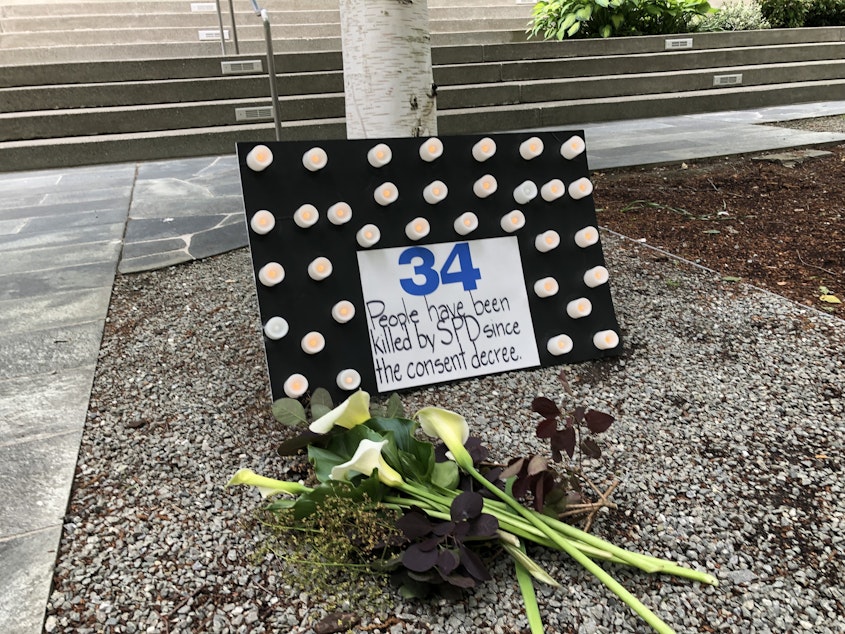Federal judge ‘extremely skeptical’ that SPD could soon exit consent decree

A federal judge is still considering how much longer the Seattle Police Department should remain under his oversight. At a hearing Tuesday, Judge James Robart asked wide-ranging questions but did not rule on a joint motion by the U.S. Justice Department and the city of Seattle to find SPD largely in compliance with a consent decree in place since 2012.
Robart did say he is “extremely skeptical” that Seattle could complete remaining milestones in the consent decree by the end of 2023. Attorneys agreed that the timeline was “ambitious.”
Robart said he is “immensely proud” of the police department's strides under the consent decree, including improved supervision, data collection, “revamped” training, and reducing its use of force by 60% since federal oversight began a decade ago.
But he noted that fatal police encounters, while few, have remained relatively stable during that time.
Harriett Walden, founder of Mothers for Police Accountability, said that statistic has been a disappointment to many community members who advocated for the consent decree after the fatal police shooting of First Nations woodcarver John T. Williams in 2010.
“If you don’t ask the right questions you don’t get the right answers and for us, accountability meant that the shootings would go down,” Walden said.
Sponsored
Kerala Cowart, an attorney for the city of Seattle, told the court that police shootings are so rare that it’s hard to draw statistically significant conclusions about them. She said the agency had three fatal police shootings in 2021, and four in 2022.
She said those shootings are rigorously investigated, and pointed to a new training for Seattle police on how to respond to people carrying knives as an example of how the department continues to try to resolve dangerous situations safely.
The proposed motion calls for continued oversight of the police department's crowd management policies and its accountability system for officers who commit misconduct.
Robart also said he’s concerned about racial disparities in police stops, and about whether ongoing contract negotiations with the Seattle Police Officers Guild, or SPOG, could undercut the accountability system.
Walden also co-chairs the Community Police Commission, which supports returning police oversight to local officials and community members. She said she found Robart’s comments encouraging.
Sponsored
“I think he’s interested in accountability systems being robust and working," she explained. "But more importantly he was talking about SPOG, and the lack of a contract right now.”
Joel Merkel, another commission co-chair, said Robart “asked a lot of tough and good questions today.” Merkel said he was encouraged that the judge asked questions about fully implementing Seattle’s 2017 police accountability law, parts of which conflicted with the previous police union contract.

Meanwhile outside the courthouse, people who have lost family members in police shootings said that they don’t consider the consent decree a success, and they want to be at the table for future oversight discussions.
Castill Hightower, whose brother was killed by Seattle Police officers in 2004, said the agency has not been transparent about the circumstances of the death of Jaahnavi Kandula, who was struck by a police vehicle in January.
Sponsored
“I definitely don’t want [the judge] to lift the consent decree based on Seattle Police doing ‘a good job’ and being ‘a model department,’” Hightower said. “I absolutely want to push back against that narrative.”
It’s not clear when Judge Robart could issue a ruling about the consent decree.




